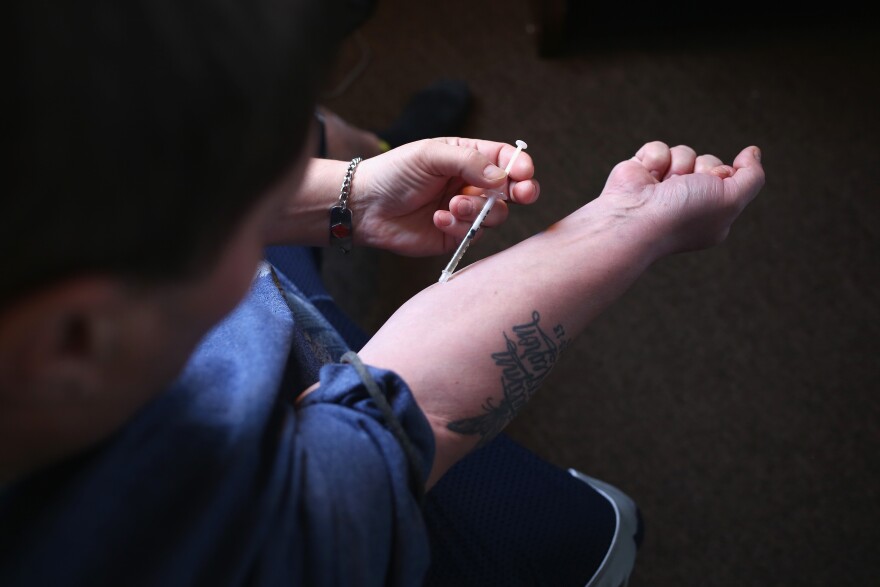This story is free to read because readers choose to support LAist. If you find value in independent local reporting, make a donation to power our newsroom today.
This archival content was originally written for and published on KPCC.org. Keep in mind that links and images may no longer work — and references may be outdated.
Could California be the first state to legalize drug injection sites?

California lawmakers may soon vote to allow for the creation of legal injection sites for IV and other drug users. The bill has passed the Assembly and is awaiting a vote in the Senate before the legislative session ends in a couple of weeks.
The measure, AB 186, would pave the way to set up these drug use sites in certain areas, including Los Angeles and San Francisco. Local government would have to give the OK to private groups that wanted to create them.
Each site would require a clean space supervised by a health care professional. It would have to be equipped with hypodermic needles, the overdose reversal drug naloxone and referrals to drug treatment.
The approach aims to prevent overdoses and the spread of HIV, Hepatitis C and other infections associated with IV drug use.
"If we treat people humanely, if they’re coming in and they’re forming a relationship, we are much more likely to treat those abscesses, much more likely to catch early rates of infection, much more likely to save lives," said Assemblywoman Susan Eggman (D-Stockton), the bill’s author.
"The ultimate goal is to get people off of drugs," she said. "And to have this as one more entry into treatment."
Eggman tried to pass a similar bill last year, but it got little traction. She says more lawmakers are receptive to the idea now because of increased recognition of the national opioid epidemic, which claimed nearly 2,000 lives in California last year.
Bill Remak, CEO of the California Hepatitis C Task Force, says harm reduction programs that get clean syringes into the hands of drug users may not entirely solve addiction, "but it mitigates much of the harm that might occur in the community."
"It’s a baby step, but it’s a very effective one," he said.
In June, the American Medical Association endorsed the idea of supervised injection facilities. It describes the approach as a way to mitigate the dangers posed by drug use.
Mark Casanova, executive director of Homeless Health Care of Los Angeles, says he’s excited about the bill’s potential.
"Legally we can’t do it," he said. "We would do it for sure if legislation passes and it gives us an opportunity to operate programming where my staff isn’t going to get arrested."
Homeless Health Care staff say they have seen first-hand that harm prevention approaches can work. They say the group's needle exchange program has decreased transmission of HIV and hepatitis C, and they’re optimistic that their overdose prevention training will prevent deaths.
Several law enforcement groups oppose Eggman's bill. They argue that it would promote crime, that those participating in the programs would be "attractive targets for other criminals who would take advantage of the clusters of impaired victims," according to a Senate Rules Committee analysis of AB 186.
Critics say the bill "would further create conflict between federal and state law, creating government-sanctioned drug dens with no requirement that participants enter treatment," the analysis says. Opponents also say "the provision prohibiting prosecution of those involved with the safer consumption programs is too broad, which could limit law enforcement’s ability to arrest individuals for drug possession who are nowhere near a program."
Governor Brown has not indicated whether he would sign the bill.
If passed, the measure would expire after five years. It also would require entities that establish supervised drug consumption sites to report data about their usage.







